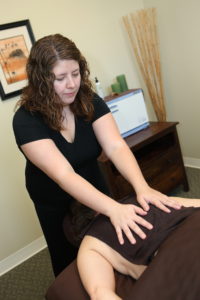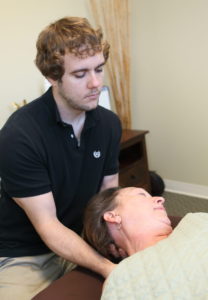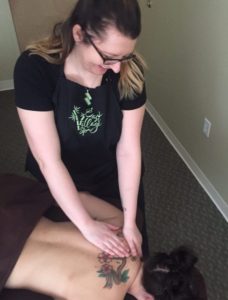
Massage Therapists have come under attack from all sides in Iowa in the last year. Early in the year, lawmakers proposed a bill to eliminate massage therapy licensing, which never made it to a vote. Criminals are increasingly and illegally using the phrase “massage therapy” as a front for illicit activities including human trafficking. Local lawmakers are targeting legitimate and licensed massage therapists including long-time small business owners with restrictions and additional fees instead of enforcing existing laws to go after the actual criminals.
At East Village Spa, our experienced licensed massage therapy team provides nearly 7,000 massage treatments per year. Some of our team members have over 10 years of experience, some have transitioned to massage from other health fields like nursing; some from other science fields like engineering. As a whole, massage therapists are skilled, trained, caring health care providers. To help consumers to know what to look for when seeking a massage therapist, we’d like to offer the following suggestions.
- Check the Iowa Department of Public Health licensing website to make sure your massage therapist is properly licensed and has not had disciplinary action taken against them. Ensure you have the proper spelling and legal name when searching. To obtain a license in Iowa, a massage therapist must have a MINIMUM of 600 hours of approved education, passed their national boards, adhere to the laws, and maintain continuing education requirements. Many therapists far exceed this minimum standard. It is illegal to practice massage therapy or call yourself a massage therapist without a license.
- It is a legal requirement that therapists display their license in their office or treatment space. If you don’t see a license posted, it is safe to assume they are not licensed and you should leave, or check online to verify that they are approved to practice.
- Value professionalism. Licensed massage therapists should ask their clients to complete a written health history or intake form and update their health information regularly. Massage may need modified for certain health concerns. Your therapist should also keep treatment notes to monitor client progress and record session data.

Justin Behanish, LMT, helps a client with a gentle neck stretch. - Look for red flags. Therapists must provide safe, clean work surroundings including clean linens and sanitized head rests and massage tools, proper hand washing and common infection control measures. Does the business provide a comprehensive website or written menu of services with rates clearly defined? Are their marketing materials and advertisements clear and professional? Are clinic hours reasonable for a health provider? If your gut tells you something is “off” then it probably is.
- A licensed massage therapist will ensure your modesty and comfort at all times. If your therapist does not step out of the room to allow you to disrobe and lay under covers, or if they work with immodest or no draping, this is a concern and a breach of their professional ethics. If your massage therapist needs to address sensitive areas like the gluteal, abdominal, or pectoralis muscles, they should discuss this with you prior to work in those areas and obtain your consent. You should still remain modestly draped during massage in these areas. If you feel uncomfortable at any time in a session, ask to end the session.
- Phrasing matters. Licensed massage therapists use professional terminology when referring to their treatments. A massage therapist will never refer to him or herself as “masseur or masseuse,” terms that have been co-opted by people providing illicit services under the guise of massage. Also, licensed massage therapists work out of practices, offices, clinics, spas, salons, hospitals, in-home, etc… but they do not refer to their work place as a “parlor” which is another phrase commonly used to insinuate illicit activities take place.
- Like you would when seeing a new doctor or counselor, seek out referrals for a massage therapist. Read reviews online, read therapist bios, look into education and specialties to find the best massage therapist for your needs and preferences.

Licensed massage therapists play a vital role now that traditional healthcare expenses are ballooning, where people are realizing the importance of alternatives to opioid pain medications, and seeking to manage stress for their overall health. It is my hope that lawmakers and people in authority will use the existing state laws to go after the human traffickers and people who are hiding under our professional title without punishing ethical, legal, LICENSED massage therapists and making it more difficult for consumers to take advantage of a safe, healthy, massage.
Learn about our licensed massage therapy team here, or schedule your therapeutic massage session by clicking here!
###
This post was written by Cassie Sampson, BA, LMT. Cassie has been an Iowa Licensed Massage Therapist since 2005, has served as massage therapy educator, and is proud to employ an incredible team of licensed massage therapists who make a difference in the lives of their clients every day.
